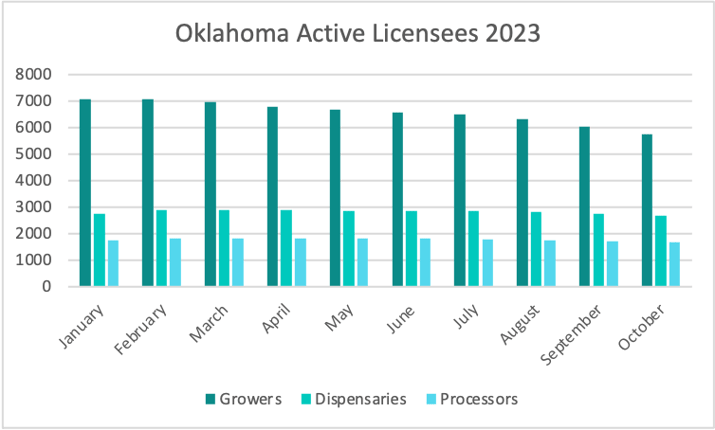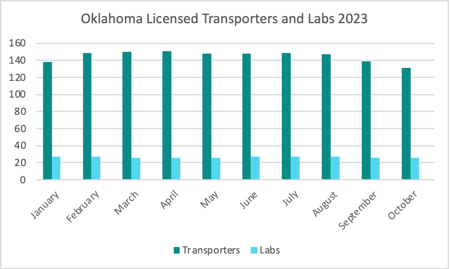The Oklahoma Medical Marijuana Authority and law enforcement are focusing attention on illegal activity at licensed cannabis businesses, resulting in arrests, fines and business shut downs.
The step-up in enforcement began at the beginning of the year, according to Kalin Bellmard, director of the Oklahoma Cannabis Industry Association (OCIA). But a lot of activity has occurred since this summer.

Source: Oklahoma Medical Marijuana Authority
Most recently, Porsha Riley, OMMA public relations manager, said the agency filed petitions against 161 licensed dispensaries for allegedly selling above the legal limit to customers. They are seeking to revoke the licenses of 39 of them, and they all face fines. Petitions for fines alone start at $5,000. Petitions for fines and revocation seek more than $20,000. The businesses, which Riley did not identify, have court dates scheduled for November.
The law regarding dispensary sales limits is not extremely clear and leaves room for some interpretation. A single transaction is limited to three ounces of marijuana, one ounce of concentrate, 72 ounces of edibles, six mature plants, “and/or” six seedling plants.
In July, OMMA raided and made arrests at Gold Leaf Acres and Green Panda Cultivation. Two other facilities were searched in August in association with the Green Panda investigation, according to an Oklahoma Multi-County Grand Jury indictment.
The search of a Green Panda site in McAlester, Pittsburg County, wasn’t announced until Oct. 9. OMMA said inspectors found more than 4,600 plants and more than 470 pounds of harvested marijuana not reported to the state inventory tracking system, Metrc. The search was initiated by a call to OMMA’s dedicated law enforcement line.
The business was shut down by an emergency order, and two people were arrested and charged with drug trafficking and other crimes. Yifan Lu, 38, was arrested pursuant to a Sept. 22 grand jury indictment. He’s accused of manufacturing, cultivating or producing a controlled dangerous substance and promoting or encouraging the possession of more than 25 pounds of marijuana at Green Panda.
Zhihui Chen, 47, was arrested on seven charges related to a separate Sept. 22 grand jury indictment. Chen is listed in the CRB Monitor database as an owner/investor in Green Panda, Zhchen Farm in Calumet, Canadian County, and International Growing Company in Maud, Seminole County. The indictment says illegal marijuana was found at the latter two dispensaries on Aug. 16.
Chen is charged with three counts of manufacturing a controlled dangerous substance and three counts of trafficking a controlled dangerous substance. He faces an additional charge of pattern of criminal offenses in two or more counties.
At Gold Leaf Acres, OMMA said it found approximately 4,000 untagged cannabis plants and more than 630 pounds of untagged cannabis. There were also harvest rooms that were allegedly undisclosed to authorities. OMMA agents and U.S. Marshals arrested the licensee at the Tulsa International Airport on suspicion of charges related to drug trafficking and obstructing an officer. Riley did not identify the arrested person and referred CRB Monitor to the Mayes County District Attorney’s office. An assistant district attorney has not responded to an email.
In September, OMMA partnered with Kay County law enforcement in investigating 11 complaints regarding Ponca City-area businesses and performing 19 other “routine compliance inspections” at licensed businesses. The operation resulted in five shutdown orders.
Two Emergency Orders of Summary Suspension and Embargo were filed Sept. 11 to immediately shut down Polar Lights and JN Green Grow. OMMA said in a statement that 160 pounds of untraceable, untagged marijuana was found at Polar Lights. Thousands of pounds of untagged and untraceable plants — plus numerous “totes, coolers, plastic bags and trash bags” — were filled with suspected illegal cannabis at JN Green Grow.
On Sept. 13, three more shutdown orders for Dihow, Zhangs Farm Inc. and L&L Magic Grower are pending further administrative proceedings. OMMA said 31 vacuum-sealed bags with untraceable marijuana were discovered at Dihow, 3,400 untagged plants and untraceable harvested marijuana were found at Zhangs Farm, and 214 pounds of untraceable cannabis was found at L&L Magic Grower.
A Year of Building Up
Oklahoma voters approved medical marijuana in 2018. In that time, relatively cheap licensing fees and easy regulations have led to a proliferation of businesses.
As of Oct. 4, there were 10,238 active business licenses in the state, a drop of approximately 2,000 since voters rejected an adult-use referendum in March. Most of the drop has been among growers. Still, there are more than twice as many licensed growers (5,752) versus dispensaries (2,688). 
OMMA was originally part of the State Department of Health, but it became a separate agency last November under a new law.
“We’re coming up on a year of being an independent agency, and we’ve spent that year ramping up our enforcement efforts,” said Riley. She said this included hiring and training staff.
In June, OMMA Executive Director Adria Berry identified eight enforcement areas:
• Untagged inventory
• Certificate of Analysis (testing) compliance
• Sales over legal limit
• Multiple licenses for one address
• Timely waste disposal
• Monitoring for unauthorized movement or diversion
• Plant destruction to prevent diversion
• Patient license reuse
“Through strategic partnerships, rigorous oversight, streamlined compliance monitoring, advancements of smart policies, and stakeholder engagement, we can foster an environment that promotes safety and prevents large-scale diversion,” Berry said.
The state legislature also provided OMMA and law enforcement with more tools by passing new laws this year. They include requiring cultivators to hold a $500,000 bond for hazardous materials clean-up, modifying medical marijuana license registration, suspension and revocation guidelines to address “straw” owners, and giving the state attorney general greater authority to subpoena documents identifying ownership interests in businesses.
Riley said the department has “definitely” been looking into straw ownership, where an out-of-state investor partners with a local who has little financial investment or management in the business in order to meet licensing requirements.
“Our commercial licensing team rigorously examines every application to identify bad actors, keeping them from entering our medical market,” she said in an email.
Additionally, the department is one year into a business license moratorium.
Riley said in an email that the drop in license numbers “can be attributed to a more rigorous licensing process, administrative actions, license surrenders and the moratorium. Another factor is the business landscape, it’s changing—and the market is saturated.”
Industry group welcomes enforcement with a watchful eye
Bellmard of the OCIA said this has been a year of enforcement catch-up with existing regulations and “clean-up of things not done properly at the beginning of this program.”
He said, “It’s good they are starting to enforce regulations. We want compliance in the industry, so we’re glad they’re doing this.”
At the same time, the association is trying to make sure enforcement doesn’t get too out of hand, getting the good with the bad.
“A lot of these businesses are trying their hardest to remain in compliance,” he said, but they don’t have the financial resources to hire consultants and lawyers. “People are human, they overlook things.”
OCIA Vice President Kaimbry White, an attorney at Overman Legal Group, is representing some of those who have been cited.
He said the association is trying to work with the state and Metrc to get information out and educate licensees.
Bellmard said he carefully vets new members and complaints that the association receives. He said he has personally reported bad actors and will continue to do so.
“If I hear something, I’ll look into it, and see what I can find. If it’s a legitimate complaint, I’ll share it with OMMA.”
Bellmard believes “very realistically” we’ll see a 30% to 40% decrease in the number of licenses. “Bad for good actors caught in the purge, but overall, good for the industry.”
-- Maria Brosnan Liebel, CRB Monitor News